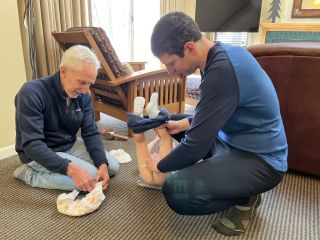Evolutionary Psychology
When All Good Fathers Come to the Aid of Their Babies
The new book, Father Time, makes the case that men make wonderful parents.
Updated June 14, 2024 Reviewed by Lybi Ma
Key points
- The first paternal vertebrates were fish.
- Many paternal birds followed. But few paternal mammals, and few in the primate order.
- Human fathers do better.
- Paleontological and ethnographic and historical and contemporary evidence is full of loving fathers.

The first vertebrate fathers who looked after their sons and daughters were underwater. Fathers take care of their progeny in roughly 25 percent of the 28,000 known species of fish: they hover over nests, fanning, aerating, and protecting clutches temporarily abandoned by mothers looking for supper. Paternal care is even more common in birds. In 90 percent of all 10,000 well-studied species, feathered fathers feed and protect chicks; and in some cases—among emus, rheas, and cassowaries—they single-parent. Mammals are much less paternal. Of around 5400 known species, just 5 percent show any evidence of direct male care. And primates generally are bad dads.
When Sarah Hrdy first set off alone for India, an intrepid 24-year-old scholar who would spend 8 years off and on studying Hanuman langurs, she wanted to know why the males kept biting infants to death. She'd made up her mind to travel to Mount Abu to find out, but she started at Harvard. “I did not particularly want a Ph.D. I just wanted to find out why these males were behaving in such an appalling way” (p. 41). Evolution, a hot topic at Harvard, would offer an answer. Most of these langurs live in groups of females, who generally are inseminated by a single male. Invading males wait for an opportunity to oust the resident fathers, then kill their infants, in order to bring their mothers into estrous and become fathers themselves. “There was a method to the seeming madness” (p. 44). Infanticide has now been reported for over 55 species, including every branch of the order Primates. Including our closest relatives, gorillas and chimps. Including us.
So what happened? How did H sapiens fathers get from infanticide agents, to indifferent observers, to occasional defenders, to loving parents?
It must have had something to do with selection pressures. Over the past few millennia, our ancestors dropped out of the shrinking forest canopy in Africa, became bipeds, started to forage and scavenge and hunt, and returned to shared camps. Family members—grandmothers, aunts, older sisters, and eventually fathers—began caring for each other’s children. Weaning times and inter-birth intervals eventually got cut in half; and brains—enormously metabolically costly—eventually got bigger by a factor of 3. Caretaking made us who we are. And fathers were part of the process. The wiring they needed had been there all along.
Sarah Hrdy has come full circle. With Father Time, out this month, she has completed her trilogy of books about taking care of babies. The first of those books, Mother Nature, would have been planned as Hrdy was raising her first daughter, with help from other volunteers at the Harvard Yard Child Care Center, but with little assistance from her otherwise occupied husband, or remote relatives in Texas. By the time the second of those books, Mothers and Others, was written, Hrdy's son and his older sisters were being raised by the wonderful Latin American au pair who became part of their family. And this, the third book, Father Time, has been inspired by the loving care Hrdy's son and son-in-law are lavishing on her beautiful grandchildren.
I love how Hrdy sweeps across thousands of millennia, and dozens of species. I love how she convinces us—given that widespread, million-year legacy; and given most of all the way contemporary Aka, Hadza, and American fathers are raising their children—that H sap males manifestly can parent as well as females. And I love how she weaves so much of this narrative into her personal story.
She talks about how the brilliant Bob Trivers, her advisor at Harvard, once notoriously unloaded to a Boston Globe reporter: “My own view is that Sarah ought to devote more time and study and thought to raising a healthy daughter” (p. 13). And she remembers how unhelpful her committee chairman, the notorious Irv DeVore, was. “When asked about my availability by colleagues from one of the very few anthropology departments eager to hire someone tainted by sociobiology (highly controversial in those days), he replied ‘Oh, Sarah. She’s married to a doctor'” (p. 15). And went on to recommend another of his students, who was married as well, but male.
Sarah’s husband, like mine, decided to become a doctor after their first children were born. When that happened to me, I hoped to hold onto the small privileges I’d been granted as the wife of a paid postdoc for 7 years. But was advised to reprioritize. “Go home and take care of your children,” they said. So I did. And got to work rewriting history, without an office or library privileges, without cash, or a spouse.
Back in the bad old days, in Sarah's cohort and mine, many women with academic positions got in as the wives and girlfriends of men with academic jobs. Almost after the fact, already a celebrity in her field, Hrdy herself got a job in the anthropology department at UC Davis as a perk tacked onto her husband’s offer at the medical school. These days, more women are being hired on the strength of their own resumes. So with Hrdy’s daughters, and mine.
When my daughter was 6 months pregnant, she negotiated a remote work contract with her biotech and was able to move home from Boston. Her pediatrician father cut back to half-time, and the 2 of us tag-teamed to raise her first baby, then the next one, then the next one. We live in a cloud of oxytocin. And we’ve never been happier. Because, as Hrdy knows: “The bauplans for ignoring or caring for vulnerable immatures have been around for hundreds of millions of years” (p. 310). The parenting of fry, chicks, pups, and babies has been the business of both mothers and fathers. And, most shocking of all, “The most ancient expression of it traces back to males.”
References
Hrdy, Sarah Blaffer. 2024. Father Time: A Natural History of Men and Babies. Princeton: Princeton University Press.
Hrdy, Sarah Blaffer. 2009. Mothers and Others: The Evolutionary Origins of Mutual Understanding. Cambridge: Harvard University Press.
Hrdy, Sarah Blaffer. 1999. Mother Nature: A History of Mothers, Infants, and Natural Selection. New York: Pantheon.


